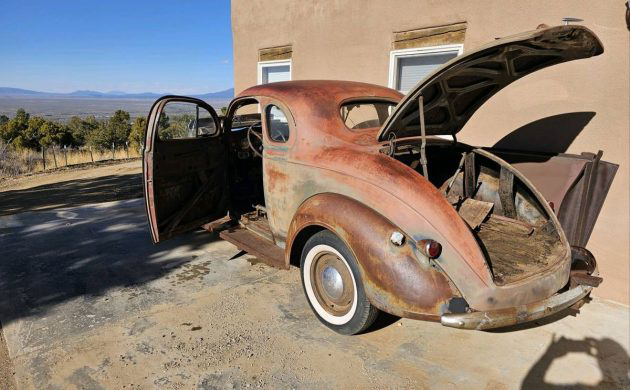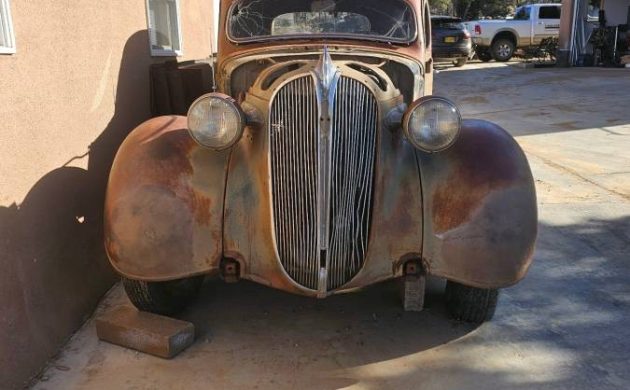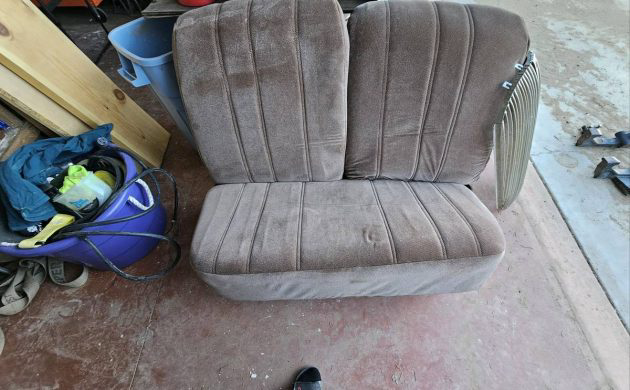Desert Baked Business Coupe: 1936 Plymouth Coupe

For those of you who have been faithful readers for a while, I am again getting back up on my soapbox concerning prewar Mopar coupes. I believe that these overbuilt but handsome coupes are one of the best choices if you want a prewar car that you can jump in and drive across the country without a fuss. That is if you properly prepared the car for the journey. Reader Gunter K. has located a very solid start for such an endeavor. This 1936 Plymouth business coupe for sale on Craigslist in scenic Taos, New Mexico has already been partially stripped and is ready to be built up into a solid driver. With a patina that only a desert car can wear, this coupe looks to be solid from stem to stern. Is the $12,900 asking price too much for a car in this condition? Thanks again to Gunter K. for the desert find!

To recap my madness, one of my bucket list items is to drive a prewar car across the United States. Fueled for much of my life by reading and re-reading Peter Egan’s “On the Road” stories in Road and Track and their two-wheeled equivalents in Cycle World, the idea is to pick up a reliable, yet distinctive car and set out for a destination across the continent. While Egan has crisscrossed the continent in nearly everything that rolls, my tastes and budget are a bit different. I like prewar cars, and my personal belief is that a Plymouth coupe would be a good choice. Previous iterations of this scenario included convertibles and sports cars. A coupe is now the choice for security concerns. It is nice to be able to lock your car up at night. Also, if I picked a 1939-1942 coupe, a column shifter is currently the best auto theft prevention device on the planet.

The 1936 Plymouth you see here would be a great starting point if you wanted to build the car from the ground up. While seemingly rough, the base metal shows no signs of rusting through in the pictures. Also, all of the parts and pieces are still with the car. The seller even tells us that it starts, runs, and stops and that the seat has been upholstered. While it is hard to determine from the pictures, the color combination is a brown interior and exterior.

If it were mine, it wouldn’t stay brown for long. The entire car would be sandblasted, primed, and repainted one of Plymouth’s distinctive 1936 colors. Perhaps Maroon, Middy Blue, or, most likely, Aquamarine Blue. After thoroughly covering the interior with Dynamat, I think I would defy Plymouth’s low-price reputation by covering the interior surfaces with supple leather in a color that compliments the exterior. I would probably regret that if the trip was made in the summer. Maybe a cloth interior would be more sensible.

Mechanically, I would try to locate and rebuild a later 230 cubic inch version of Plymouth’s flathead six. The last time they were used in a Plymouth automobile was in 1959. That year, the engine boasted 135 horsepower and 205 ft-lbs. of torque at a low 1,200 RPM. Backing it up would be a later three-speed with overdrive or one of the more modern five-speed conversions that are now available for these engines. A conversion to modern U-joints would be on the agenda, and maybe swap out the original rear end for a later model Mopar rear with a more highway-friendly rear-end. While adequate, the brakes would require an update. There are now kits available to convert these cars to disc front brakes and a dual reservoir master cylinder. Perhaps a custom radiator, an auxiliary electric fan, and a conversion to a 12-volt electrical system and an alternator would be good insurance for the trip out west.
By the time I got done rebuilding the car the way I wanted, the cash for the trip would likely be long gone. What I would be left with, besides a devastated credit rating, would be a car that would be ready at a moment’s notice to cross the country. These cars are well-built and easy to work on, and parts are available on the road at your local NAPA or can be had within a 48-hour shipping window. The asking price on this particular Plymouth may have me looking for other candidates, but I cannot deny the allure of a solid body to start such a project.
Would you like to make a cross-country trip in an older car? Do you think I am on the right track with this Plymouth, or would you have a different choice? Please share your thoughts in the comments.
Auctions Ending Soon
 2006 Ford Mustang Saleen S281 SCBid Now1 days$15,000
2006 Ford Mustang Saleen S281 SCBid Now1 days$15,000
 2002 Subaru Impreza WRXBid Now4 days$100
2002 Subaru Impreza WRXBid Now4 days$100
 1975 Chevrolet Corvette ConvertibleBid Now4 days$3,000
1975 Chevrolet Corvette ConvertibleBid Now4 days$3,000
 1964 Ford F-100 Camper CustomBid Now4 days$500
1964 Ford F-100 Camper CustomBid Now4 days$500
 2006 Jeep Wrangler SportBid Now6 days$4,000
2006 Jeep Wrangler SportBid Now6 days$4,000

Comments
I like the way you think Jeff. Good write up. Price way to high for a car this rough any way you look at it.
I agree with you 100 percent on that price.
Lot’s of 30,40,&50’s around now. Like the car don’t like the price
Agree – although it’s nice it runs – most buyers will update it and why we are at it price wise – there isn’t to much a demand for Mopars of this vintage .
Good luck to seller and buyer….I do like it but not for me.
Ripe for an old School Hemi….
From the looks of the immortal gm alternator, it’s already been converted to 12v.
All we have is rusty junk here, this car is clean and would mske a great rod or resto. $3000.00 to $4000.00 would be tops, $12k is wishful thinking
Love the pre-war and early post-war Plymouths. At 14 yo in 1958 I tried to buy a 1940 Plymouth coupe but the guy took parts off it after we had a handshake deal and before we came back to get it the next day, so no deal. Ended up with a ’46 Plymouth coupe, much the same car. Easy to work on, learned a lot.
The ’40 Fords are iconic and I love them but those era Plymouths just stand out to me. This particular car is beyond my capabilities and is too optimistic, but I’d love to see someone bring it back along the lines of the author’s comments.
As an aside, I live just a few hours north of
Taos and have been in the area many times. For some reason there seems to be an abundance of potentially build able cars in the general area. Always see a number of mouthwatering examples but you better ask first before looking ’cause people are particularly unfriendly to outsiders there.
It’s not a 1936 Plymouth It’s pure 1937 Beautiful, rellaible , smooth and trustable but…..what a task to get it back to be a daily use car !!!
Hi Guys and Girls The Plymouth is not a 1936 It is a 1937 Not sure why no one caught that
Was waiting for someone to say it’s a 1937, thanks, Fernando
Love the old coupes Chevy,Ford Mopar but could never put an engine in anything that wasn’t produced by the manufacturer. Chevy in Chevy, Ford in Ford ,and Mopar engine in a Mopar
AMEN! I would get the original engine running and drive it as is. My earliest memories are of riding in my parents 1940 something Plymouth and laying on floor in the back and going to sleep from the engine whine and clashing of gears. If I could only relive that time again with my parents.
So yet again we have another unrealistic seller who is way overpricing their ask IMO. As I have mentioned many times before; I am a big fan of Mopar business coupes. And pre-war is pretty neat. There is potential here but it will cost as much or more as the asking price to bring it up to the level I would want. And I personally am growing weary of the “patina” pitch. It’s a misnomer for sunburnt paint, lackluster chrome, stainless and surface rust. That makes it worth a lot less than a car with decent paint and trim. Then there’s the interior which needs everything. Sorry but this is maybe a $3,500 car and that’s assuming it runs out OK. BTW, Jeff you have a great idea of a road trip. I hope you get to experience it someday.
Listing has already been deleted
My first car was a 1937 Plymouth business coupe that we rescued from a NH farmer’s backyard. Many great memories. The old Plymouth featured here is definitely a 37!